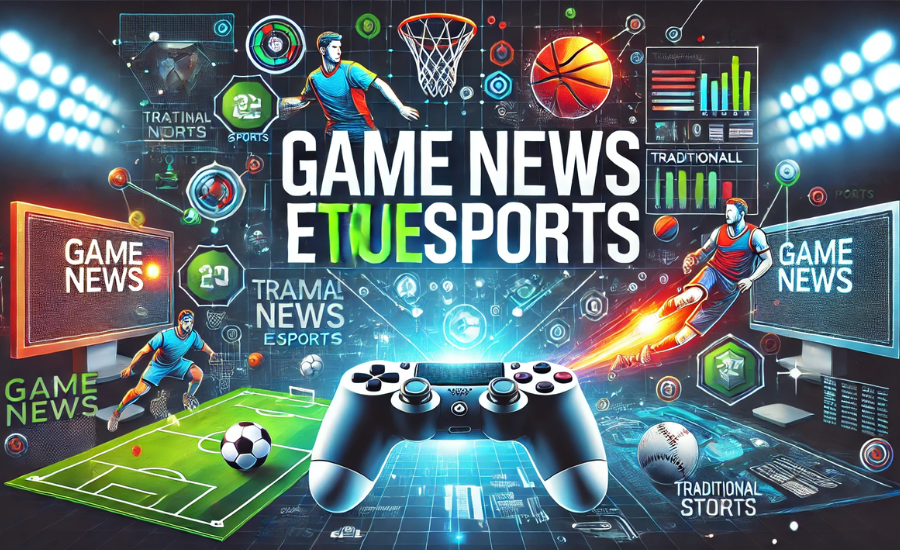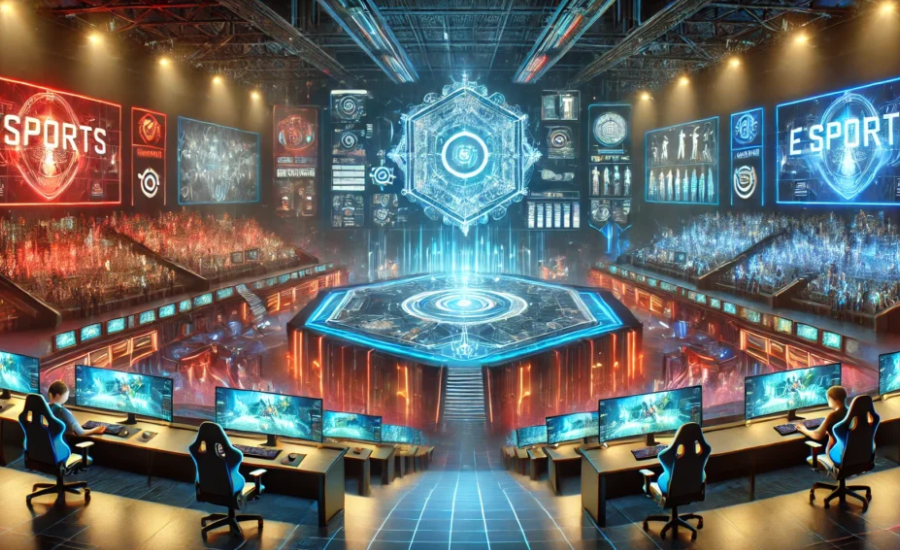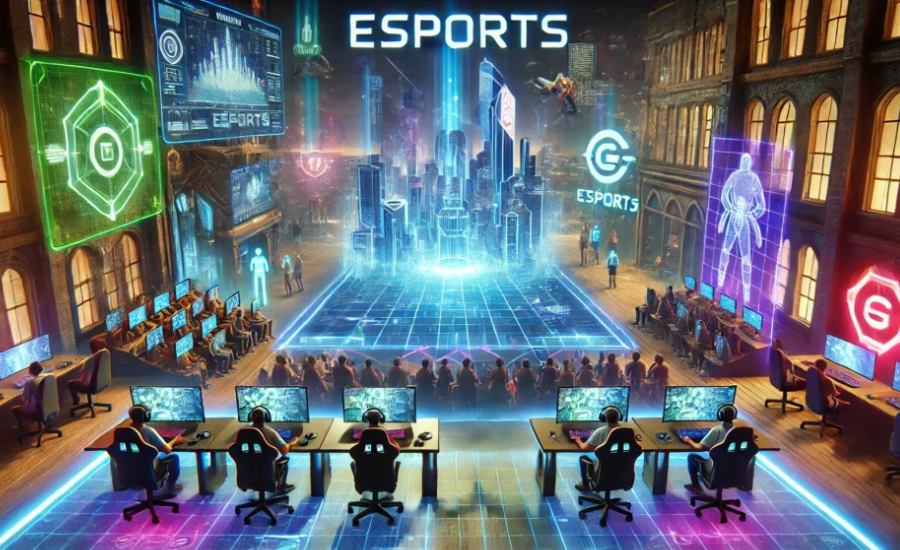Gaming news Etruesports brings a fresh perspective on the exciting and ever-evolving world of competitive gaming, often referred to as esports. Esports encompasses a wide array of competitive video games, where elite players and top-tier teams battle it out in high-stakes tournaments. The spectrum of games includes popular genres such as real-time strategy (RTS), fast-paced first-person shooters (FPS), and strategic multiplayer online battle arenas (MOBA).
What was once considered a niche hobby has grown into a global entertainment powerhouse, with esports capturing the attention of millions of passionate fans and viewers worldwide. The competitive gaming scene now enjoys mainstream recognition, drawing massive crowds both online and in physical arenas. It has seamlessly integrated into the fabric of modern entertainment, offering new avenues for technology, business, and culture to flourish.
As the esports ecosystem expands, it continues to reshape traditional media, creating lucrative career opportunities, sponsorships, and innovative advancements in gaming technology. Whether you’re a player, a fan, or someone simply exploring the world of competitive gaming, the influence of esports is undeniable and continues to change the landscape of the digital entertainment industry. Through gaming news Etruesports, you can stay updated on the latest developments, trends, and the future of this exhilarating and dynamic industry.
Gaming News Etruesports: Where to Find the Latest Codes for Your Favorite Games

When it comes to unlocking exciting in-game content or special offers, knowing where to find the latest codes is essential. For gaming enthusiasts, discovering new codes can unlock a world of rewards, from exclusive skins to limited-time events. Here are some top sources to help you stay ahead and get the best codes, as shared in gaming news Etruesports:
- Official Game Websites and Social Media Channels
The primary and most reliable source for game codes is the official website and social media accounts of the game developers. Many developers release special codes through these platforms, often tied to promotional events or seasonal updates. By following your favorite games on social media or checking the official website regularly, you can stay up to date on the latest codes as soon as they are released. These codes often offer in-game bonuses like exclusive skins, early access to content, or discounts on digital items. - Gaming Forums and Online Communities
Gaming forums and online communities are vibrant spaces where players from around the world come together to share their experiences, tips, and discoveries. Reddit, Discord, and dedicated game-specific forums are excellent places to find new codes shared by fellow gamers. These communities often post fresh codes shortly after they’re released, and you can sometimes find hidden or exclusive codes that might not be advertised through official channels. Engaging in these forums will ensure you never miss an opportunity to unlock new content. - Email Newsletters and Subscriptions
Many game developers offer email newsletters to keep players informed about the latest updates, events, and promotions. These newsletters are often packed with exclusive codes, offering early or limited access to special content, giveaways, and in-game items. By subscribing to your favorite games’ newsletters, you ensure you’re among the first to know about new opportunities and promotions. These exclusive codes are a great way to enhance your gaming experience and stay ahead of other players.
By keeping an eye on these valuable sources, you’ll be able to take full advantage of the latest codes and enjoy enhanced gaming experiences. Stay connected with gaming news Etruesports to keep track of all the hottest releases and offers!
Gaming News Etruesports: Tracing the Evolution of Esports from its Origins to Global Phenomenon

Esports, a thriving and ever-evolving sector of the gaming industry, has a rich history that traces its origins back to the early days of video games. Through decades of innovation, competition, and technological advancement, esports has transformed into a global entertainment force. Here’s a detailed look at the history of esports, highlighting key milestones and pivotal moments that shaped the competitive gaming landscape.
The Early Days: A Humble Start in the 1970s
The foundation of esports can be traced to a groundbreaking event in 1972, when the first known competitive video gaming tournament took place at Stanford University. The game, “Spacewar,” marked the beginning of a new era for video games, setting the stage for future competitive events. During the 1980s, arcade gaming competitions began to gain momentum, with local and regional tournaments capturing the attention of gamers. This era marked a time when gaming was still a niche activity, but its competitive nature started to gain recognition.
The Rise of Online Gaming in the 1990s
As the internet began to expand in the 1990s, so did the concept of online multiplayer games. This decade witnessed the rise of iconic games like “StarCraft” and “Counter-Strike,” which became the bedrock of the modern esports scene. These games revolutionized competitive gaming, offering players the ability to compete against one another across vast distances. With the development of global online tournaments, esports began to attract an international audience, laying the groundwork for the global esports ecosystem we see today.
Esports Explosion: The 2000s to Present
The 2000s and 2010s marked the period where esports truly began to emerge as a major force in the entertainment industry. Large-scale tournaments such as the World Cyber Games (WCG) and Electronic Sports World Cup (ESWC) garnered widespread attention, drawing large numbers of spectators and participants from around the world. The introduction of streaming platforms like Twitch played a pivotal role in bringing esports to the mainstream, allowing fans to watch live competitions from anywhere in the world. As viewership grew, so did the opportunities for sponsorships, media coverage, and professional gaming careers. This explosive growth catapulted esports into the limelight, establishing it as a mainstream industry that now competes with traditional sports in terms of global reach and revenue.
Through these key moments, esports has evolved into a multi-billion-dollar industry, constantly pushing the boundaries of gaming culture and entertainment. As we continue to see advancements in technology, gaming news Etruesports offers ongoing coverage of the latest developments and trends shaping the future of competitive gaming.
Gaming News Etruesports: A Guide to the Different Types of Game Codes and Their Uses

In the world of competitive gaming, codes play a crucial role in enhancing the player experience. Whether you’re looking for exclusive in-game rewards or seeking to gain an edge in your favorite titles, understanding the different types of game codes is key. Below is an overview of the main categories of codes you’ll encounter in gaming, as shared through gaming news Etruesports.
Promotional Codes: Unlocking Exclusive Rewards During Special Events
Promotional codes are typically distributed during special events, promotions, or collaborations between game developers and third-party partners. These codes grant access to exclusive, time-sensitive items, bonuses, or in-game perks that are not usually available. They can often be found through social media campaigns, special announcements, or in-game celebrations. By keeping an eye on these codes, players can gain early access to unique skins, limited-edition gear, or exclusive in-game events that would otherwise be hard to obtain. These codes are perfect for those who want to add special flair to their gaming experience.
Cheat Codes: Changing the Rules of the Game
Cheat codes are a long-standing part of gaming culture, enabling players to alter the game’s mechanics in ways that provide an advantage or create fun, unexpected outcomes. These codes can give players abilities like unlimited health, invincibility, or access to hidden features within the game. Often, cheat codes are hidden by developers to add an extra layer of fun or to allow players to bypass challenging aspects of gameplay. While they’re not typically used in competitive esports, cheat codes are still popular among casual players who wish to explore the game in a new light or have a more relaxed experience.
Redemption Codes: Claiming Specific Rewards and Bonuses
Redemption codes are another common type of code in the gaming world, designed to allow players to claim specific rewards, such as free in-game items, currency, or other bonuses. These codes are usually entered into a redemption portal either within the game itself or on the developer’s website. Redemption codes are often distributed as part of special promotions, giveaways, or in exchange for participating in certain activities within the game. For esports enthusiasts, redemption codes can offer valuable bonuses that enhance gameplay, provide in-game currency, or unlock exclusive content to personalize their experience.
By understanding these different types of codes, players can take full advantage of the rewards and enhancements available to them. Stay informed on the latest code releases and gaming promotions through gaming news Etruesports, ensuring you never miss an opportunity to maximize your gaming experience.
Gaming News Etruesports: Exploring the Dynamic Esports Ecosystem

The world of esports is an intricate and vibrant ecosystem that goes beyond just the players and games themselves. It encompasses various elements that combine to create an immersive and rapidly growing industry. From the athletes and teams who dedicate their lives to competing, to the global fanbases that cheer them on, esports has become a multi-faceted phenomenon. Here’s a deeper look at the core components of the esports ecosystem, as seen through gaming news Etruesports.
Players and Teams: The Rise of Esports Athletes
In esports, players are often regarded as celebrities, admired not only for their remarkable gaming skills but also for their ability to entertain and engage with millions of fans. Professional esports athletes are increasingly viewed as modern-day sports figures, often achieving global recognition for their success in high-stakes competitions. These players are required to undergo rigorous training regimens that resemble those of athletes in traditional sports, with many dedicating countless hours to mastering their craft.
Top-tier teams, such as Team Liquid and Cloud9, have established themselves as household names in esports. These teams are equipped with managers, coaches, analysts, and support staff to help guide their players to success. Esports teams often form strategic partnerships with major sponsors, securing financial backing and exposure that help fuel their growth. In return, these teams compete in prestigious tournaments where they vie for substantial prize pools, sponsorship deals, and widespread recognition within the gaming community. The rise of these teams and players has transformed esports into a professional career path, offering lucrative opportunities for talented individuals to thrive.
Tournaments and Leagues: The Stage for Global Competition
Esports tournaments serve as the pinnacle of competitive gaming, where the most skilled teams and players from around the world converge to compete for large cash prizes and global acclaim. These events showcase the talent and dedication of esports athletes, offering fans a front-row seat to intense competition. Some of the most prestigious tournaments in the industry include The International for Dota 2 and the League of Legends World Championship, both of which feature multi-million-dollar prize pools and attract millions of viewers from across the globe.
In addition to these one-off tournaments, esports leagues like the Overwatch League and the League of Legends Championship Series (LCS) have become integral to the ecosystem. These leagues operate year-round, with teams competing in regular-season matches leading to playoffs and finals. The creation of these leagues has helped further solidify esports as a professional sport, bringing structure and consistency to the competitive scene while increasing visibility for teams, players, and sponsors alike.
Spectators and Fans: Building a Global Esports Community
One of the driving forces behind the success of esports is the passionate fanbase that supports it. The advent of streaming platforms like Twitch and YouTube Gaming has revolutionized how fans engage with esports, allowing them to watch live tournaments, interact with players, and immerse themselves in the community. These platforms provide real-time access to matches, commentary, and behind-the-scenes content, creating a dynamic experience for viewers.
Esports has fostered a global network of fans who are deeply invested in the games and players they follow. These fan communities form an essential part of the esports ecosystem, offering support and encouragement for teams and players while also helping to create an engaging atmosphere for everyone involved. The interaction between fans and athletes is a unique aspect of esports, where fans can directly communicate with players through live chats, social media, and fan events. This level of fan engagement has been a key factor in propelling esports into mainstream entertainment, giving it a massive cultural impact.
As the esports industry continues to grow, these interconnected elements—players, teams, tournaments, and fans—will continue to shape the future of competitive gaming. Stay up-to-date on the latest happenings in the esports world with gaming news Etruesports, your go-to source for insights, trends, and updates on everything esports.
Gaming News Etruesports: Essential Components Powering Competitive Gaming Success

In the world of esports, the right tools and infrastructure are vital for professional gamers to achieve peak performance. Whether you’re a competitive player or a spectator, understanding the key components that drive the esports industry helps provide insight into what makes these games and events possible. Let’s take a closer look at the essential elements that fuel competitive gaming, as discussed in gaming news Etruesports.
Hardware: The Backbone of Professional Gaming
At the highest level of esports, the hardware players rely on is of utmost importance. Elite gamers use powerful, high-performance gaming PCs or consoles that are capable of handling graphically demanding games without lag. These systems are often customized with state-of-the-art components to ensure fast processing speeds and seamless performance under pressure.
In addition to the central gaming unit, peripherals such as mechanical keyboards, responsive gaming mice, and high-quality headsets are integral to professional gameplay. These devices are designed with precision, speed, and comfort in mind, offering a competitive edge during fast-paced matches. Gaming-specific monitors with high refresh rates and low response times also play a crucial role by delivering smooth, fluid gameplay, allowing players to react instantly in real-time scenarios.
Software: Powering Esports Games and Streaming Platforms
The heart of any esports competition lies in the games themselves. Titles like League of Legends, Dota 2, Fortnite, and Counter-Strike: Global Offensive are staples in the esports ecosystem, providing a diverse range of genres that cater to a wide array of player preferences. These games are continually updated with patches, new features, and balance changes to maintain fairness and excitement, keeping the competitive environment fresh and engaging for both players and fans alike.
In addition to game software, streaming platforms are essential to the esports industry. Services like OBS Studio and Twitch allow gamers to broadcast their live gameplay to global audiences, helping to foster vibrant communities and increase viewership. For players participating in high-stakes tournaments, anti-cheat systems are indispensable in maintaining the integrity of competitions, ensuring a level playing field and preventing unfair advantages during gameplay.
Connectivity: Ensuring a Seamless Gaming Experience
Esports would not be possible without reliable and high-speed internet. Whether competing in global tournaments or streaming to an audience, fast and stable internet connections are crucial for smooth, uninterrupted experiences. Emerging technologies, such as 5G networks, are pushing the boundaries of connectivity, providing players with ultra-low latency and faster data transmission speeds. This ensures that gamers can enjoy lag-free gameplay while participating in competitive matches, regardless of where they are located in the world.
In both online gaming and live streaming, a reliable connection is essential to maintaining the flow of the game and ensuring that audiences experience the action in real time. For esports organizations, reliable internet infrastructure is key to hosting events that attract global audiences, and for players, it means the difference between victory and defeat.
Together, these key components—hardware, software, and connectivity—form the backbone of the esports industry, allowing players to perform at their best while giving fans the immersive experiences they crave. As gaming technology continues to evolve, stay informed with gaming news Etruesports to learn about the latest innovations and trends shaping the future of competitive gaming.
Gaming News Etruesports: The Economic and Social Impact of Esports and the Role of Technology in Its Growth
Esports is no longer just a niche hobby; it has evolved into a multi-billion-dollar industry that significantly impacts both the economy and society. From creating new job opportunities to driving technological advancements, the influence of esports spans across multiple sectors. In this article, we’ll explore the key economic, social, and technological factors that contribute to the continued success of esports, as highlighted in gaming news Etruesports.
Economic Impact: A Multi-Faceted Revenue Stream
The esports industry generates substantial revenue through a variety of channels, each contributing to its rapid growth and expansion. Major revenue sources include sponsorships, advertising, media rights, ticket sales, and merchandise. High-profile esports events attract sponsorship deals from global brands, making the industry highly lucrative. For example, broadcast rights for tournaments such as The International bring in millions of dollars, while sponsorship deals with major companies further solidify the financial foundation of esports.
Prize money is another driving force behind the growth of the esports industry, with tournaments offering prize pools that rival those of traditional sports. In 2022, The International for Dota 2 boasted a staggering prize pool of over $40 million, underscoring the immense financial stakes involved. The growing revenue streams help sustain the infrastructure of competitive gaming, supporting everything from grassroots events to massive global tournaments.
Employment Opportunities: A Thriving Job Market
As esports continues to grow, so do the employment opportunities it offers. While professional players take center stage, many other roles are critical to the smooth operation and success of the industry. Coaches, analysts, and event organizers play pivotal roles in preparing players for competition and ensuring events run smoothly. In addition, commentators, streamers, and content creators help bring esports to life, offering live coverage and engaging content for fans around the world.
Beyond direct competition, the esports industry also generates jobs in marketing, public relations, broadcasting, and production, helping to support the ecosystem and raise the profile of esports globally. These diverse job opportunities make esports an attractive career path for individuals with a variety of skills and interests, further bolstering the industry’s economic impact.
Cultural Influence: Uniting a Global Community
Esports has made a significant cultural impact, particularly among younger generations, by transforming video gaming into a competitive and professional pursuit. What was once considered a hobby has now become a recognized industry, with competitive gaming offering both prestige and financial rewards. Esports has also become a global connector, bringing together people from different cultures, backgrounds, and geographies through a shared passion for gaming.
The increasing participation of women in esports and the growing fanbase across the world are reshaping the cultural landscape. As more people engage with esports, we are seeing greater diversity in terms of gender, race, and geography. This inclusivity helps to build a more global and welcoming community, where players and fans can connect regardless of their background. Esports is breaking down cultural barriers and creating a universal language through the love of gaming.
Technology Driving Esports Growth: Innovation and Integration
The rapid advancement of gaming technology is another key factor contributing to the expansion of esports. Innovation in gaming hardware, such as GPUs, CPUs, and gaming accessories, plays a significant role in providing players with the tools needed to compete at the highest level. These continuous improvements ensure that both casual and professional gamers enjoy the best possible experience, enhancing the overall quality of gameplay.
Emerging technologies like virtual reality (VR) and augmented reality (AR) are beginning to influence the esports landscape, offering immersive experiences that go beyond traditional gaming. Though still in its early stages, VR and AR have the potential to redefine how games are played and experienced, allowing players and spectators to interact with games in new and exciting ways. As these technologies continue to develop, we can expect even more innovative experiences to emerge in the esports sector.
Streaming platforms such as Twitch, YouTube Gaming, and Facebook Gaming also play a crucial role in the growth of esports by enabling players to broadcast their gameplay to a global audience. These platforms provide an interactive space for gamers to engage with their followers and monetize their content, which has helped foster the massive online communities surrounding esports. Through streaming, fans can follow their favorite players, watch live events, and even participate in gaming-related discussions, creating a vibrant and engaged audience that drives the industry forward.
As technology continues to shape the future of esports, gaming news Etruesports will continue to provide insights into the latest innovations and trends that are driving this exciting and dynamic industry.
Summary
The future of esports is set to be defined by rapid technological advancements, a wider audience, and an increased focus on education and career opportunities. Technology such as AI-powered analytics, virtual reality (VR), and augmented reality (AR) will continue to shape esports by providing more immersive and interactive experiences. The growth of streaming platforms has expanded esports’ reach, attracting fans from all backgrounds, whether or not they play the games themselves. Moreover, esports is increasingly integrated into educational systems, offering students pathways to careers in gaming, technology, and beyond, with opportunities such as esports scholarships and academic programs. Overall, esports is transitioning into a mainstream global phenomenon with immense potential for both entertainment and personal development.
FAQs
Q: What are the technological advancements that will shape the future of esports?
A: AI-powered analytics, real-time data collection, virtual reality (VR), and augmented reality (AR) are key technologies expected to transform esports by improving player performance and creating more immersive experiences for both players and fans.
Q: How has the audience for esports expanded?
A: Esports is attracting a broader audience thanks to the accessibility of streaming platforms like Twitch, YouTube Gaming, and Facebook Gaming. These platforms allow anyone, regardless of gaming experience, to watch live events and engage with the esports community.
Q: What are the educational opportunities related to esports?
A: Esports is becoming an integral part of educational programs, with universities offering specialized degrees in game design, esports marketing, and event management. Additionally, esports academies and scholarships provide opportunities for students to develop gaming skills while pursuing higher education.
Q: How does esports impact the economy?
A: Esports generates revenue through sponsorships, advertising, media rights, ticket sales, and merchandise. Major tournaments attract significant investments, and esports teams also contribute to job creation in areas such as coaching, broadcasting, and content creation.
Q: What role does streaming play in the growth of esports?
A: Streaming platforms play a pivotal role in the growth of esports by offering a space for fans to watch live events, interact with players, and engage with the community. These platforms have made esports more accessible to a global audience, helping to establish it as a mainstream form of entertainment.
Q: How are VR and AR influencing esports?
A: VR and AR are still in the early stages of integration into esports but have the potential to significantly enhance gameplay by providing immersive environments for players and offering spectators new ways to engage with the action. These technologies could transform both how esports tournaments are played and how fans experience them.

